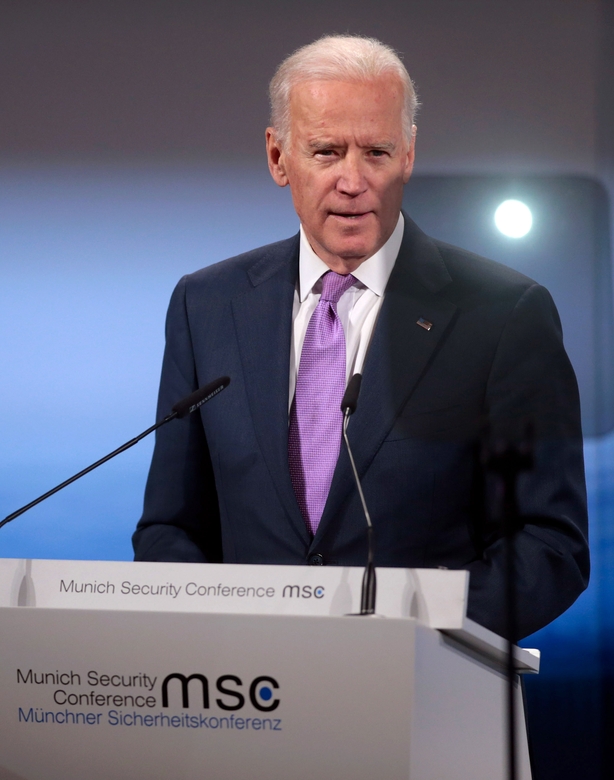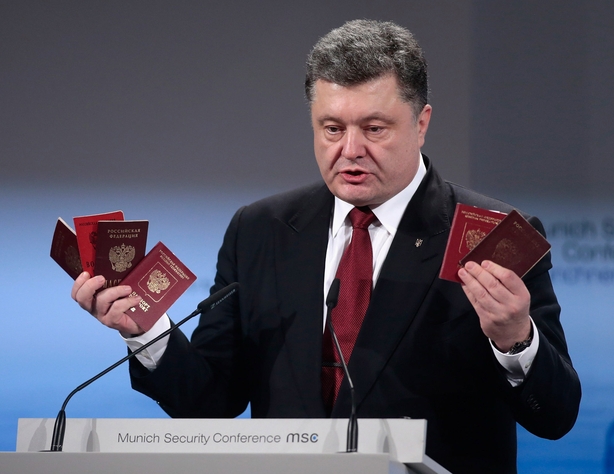Germany's Angela Merkel has said sending arms to help Ukraine fight pro-Russian separatists would not solve the crisis there, drawing sharp rebukes from US politicians who accused Berlin of turning its back on an ally in distress.
The heated exchanges at a security conference in Munich pointed to cracks in the transatlantic consensus on how to confront Russian President Vladimir Putin over a deepening conflict in eastern Ukraine that has killed more than 5,000.
A Franco-German initiative to end the conflict in eastern Ukraine is reportedly based on the Minsk peace pact, but will contain more details on the implementation and timing of the deal.
Ukraine's military reported pro-Russian separatists had stepped up shelling of government forces and appeared to be amassing troops for new offensives on the key railway town of Debaltseve as well as the coastal city of Mariupol.
The rebel offensive has triggered a flurry of shuttle diplomacy, with Merkel and French President Francois Hollande jetting to Moscow yesterday to try to convince Russia to enter into a peace deal.
But European officials acknowledge the Russian leader may have little incentive to negotiate now, preferring to sit back and watch as separatists seize more territory, undermining a ceasefire agreement clinched last September in the Belarus capital Minsk.
The German leader conceded in Munich, after returning home from Moscow in the dead of night, that it was uncertain whether a Franco-German peace plan presented to Kiev and Moscow this week would succeed.
However, she flatly rejected the notion that sending weapons to Kiev, an idea being considered by US President Barack Obama, would help resolve the conflict.
"I understand the debate but I believe that more weapons will not lead to the progress Ukraine needs. I really doubt that," said the conservative German leader, who has led western efforts to try to resolve the crisis through negotiations and will travel to Washington on Sunday for talks with Mr Obama.
US Vice President Joe Biden, speaking at the same conference, tried to play down differences with Europe, saying he and Mr Obama agreed no efforts should be spared to resolve the conflict peacefully.

But he made clear Washington stood ready to provide Ukraine with the means to defend itself, saying: "Too many times President Putin has promised peace and delivered tanks, troop and weapons."
Russia ‘not going to wage war on anyone’
Meanwhile, Russian President Vladimir Putin has said Russia did not plan to wage war on anyone although a world order where one leader tells others what they can do would not suit Moscow.
The comments were the first from Mr Putin since he met French President Francois Hollande and German Chancellor Angela Merkel on the crisis in the Ukraine on Friday.
"There clearly is an attempt to restrain our development with different means. There is an attempt to freeze the existing world order ... with one incontestable leader who wants to remain as such thinking he is allowed everything while others are only allowed what he allows and only in his interests," Mr Putin said.
"This world order will never suit Russia ... But we are not going to wage war on anyone, we are going to cooperate with all," he said during a meeting with labour unions in the southern city of Sochi.
Kiev and the West accuse Moscow of fomenting pro-Russian rebellion in eastern Ukraine and supplying arms and fighters. Moscow denies the accusation.
Mr Putin repeated that Western sanctions imposed on Russia in retaliation over its role in the Ukraine conflict would not work.
"Sanctions - in the end I think they will not bring joy to anyone and they clearly can't be efficient with regard to a country like ours, although they are causing a certain damage to us. And we should understand this and increase our sovereignty level including in the economy," he said.
Ukrainian President issues plea for support

In an emotional plea for support in Munich, Ukrainian President Petro Poroshenko listed the number of troops and civilians that had been killed since the crisis started and held up red passports of Russian soldiers he said had been found fighting in Ukraine.
"We are an independent nation and we have a right to defend our people," he said, calling for political, economic and military support. Calling himself a "president of peace", he made clear that Kiev only wanted defensive weaponry.
He received strong backing from Lithuanian President Dalia Grybauskaite, who said Ukraine should be supported "with all means necessary to defend, not to attack, to defend its people and its territory."
Russian Foreign Minister Sergei Lavrov, also in Munich, said there were "good grounds for optimism" that the talks between leaders could yield a deal.
But Mr Lavrov also delivered a diatribe against the West. He accused both Europe and the US of supporting a "coup d'etat" against deposed Ukrainian leader Viktor Yanukovich, a Moscow ally, a year ago and turning a blind eye to nationalists he said were intent on ethnic cleansing in eastern Ukraine.
Mr Hollande, speaking to reporters in the city of Tulle in central France, cast the talks with Mr Putin as a last-ditch effort to avert full-blown conflict.
The French leader, Ms Merkel, Mr Poroshenko and Mr Putin are due to hold a call tomorrow, before the chancellor travels to Washington.
"If we don't manage to find not just a compromise but a lasting peace agreement, we know perfectly well what the scenario will be. It has a name, it's called war," Mr Hollande said.

